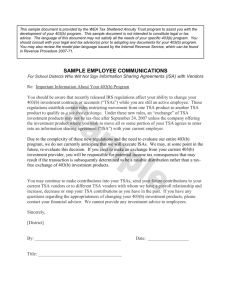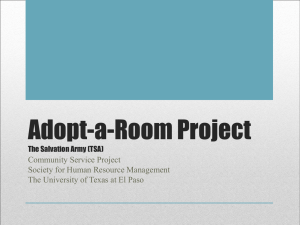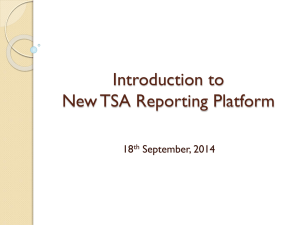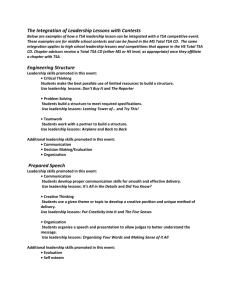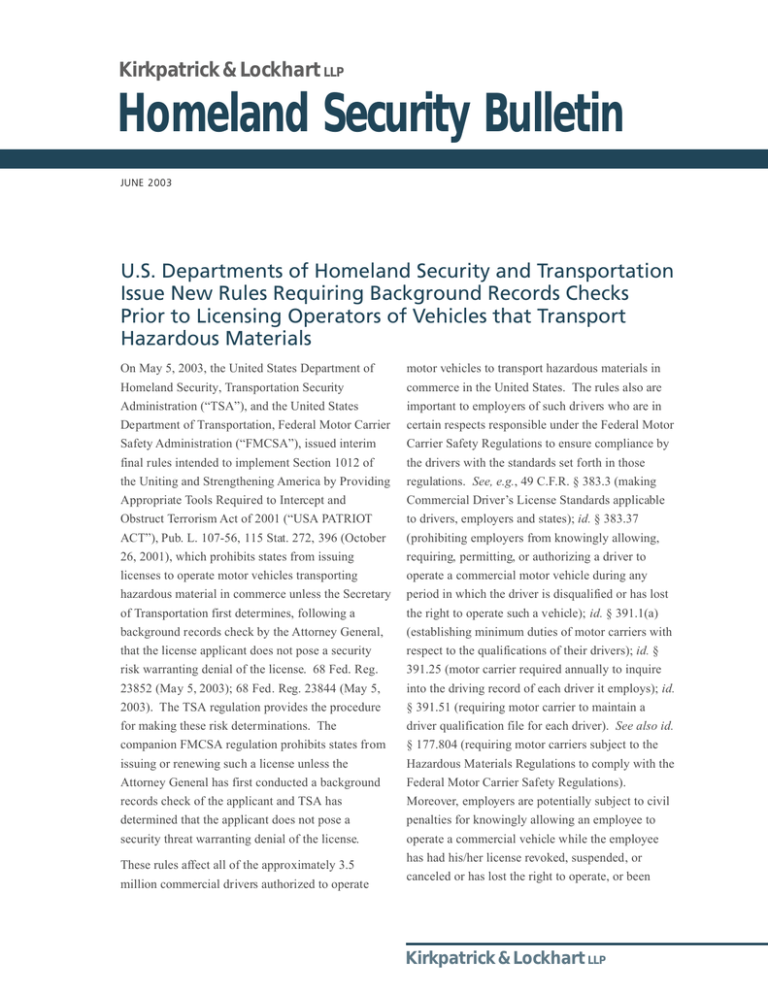
Kirkpatrick & Lockhart LLP
Homeland Security Bulletin
JUNE 2003
U.S. Departments of Homeland Security and Transportation
Issue New Rules Requiring Background Records Checks
Prior to Licensing Operators of Vehicles that Transport
Hazardous Materials
On May 5, 2003, the United States Department of
Homeland Security, Transportation Security
Administration (“TSA”), and the United States
Department of Transportation, Federal Motor Carrier
Safety Administration (“FMCSA”), issued interim
final rules intended to implement Section 1012 of
the Uniting and Strengthening America by Providing
Appropriate Tools Required to Intercept and
Obstruct Terrorism Act of 2001 (“USA PATRIOT
ACT”), Pub. L. 107-56, 115 Stat. 272, 396 (October
26, 2001), which prohibits states from issuing
licenses to operate motor vehicles transporting
hazardous material in commerce unless the Secretary
of Transportation first determines, following a
background records check by the Attorney General,
that the license applicant does not pose a security
risk warranting denial of the license. 68 Fed. Reg.
23852 (May 5, 2003); 68 Fed. Reg. 23844 (May 5,
2003). The TSA regulation provides the procedure
for making these risk determinations. The
companion FMCSA regulation prohibits states from
issuing or renewing such a license unless the
Attorney General has first conducted a background
records check of the applicant and TSA has
determined that the applicant does not pose a
security threat warranting denial of the license.
These rules affect all of the approximately 3.5
million commercial drivers authorized to operate
motor vehicles to transport hazardous materials in
commerce in the United States. The rules also are
important to employers of such drivers who are in
certain respects responsible under the Federal Motor
Carrier Safety Regulations to ensure compliance by
the drivers with the standards set forth in those
regulations. See, e.g., 49 C.F.R. § 383.3 (making
Commercial Driver’s License Standards applicable
to drivers, employers and states); id. § 383.37
(prohibiting employers from knowingly allowing,
requiring, permitting, or authorizing a driver to
operate a commercial motor vehicle during any
period in which the driver is disqualified or has lost
the right to operate such a vehicle); id. § 391.1(a)
(establishing minimum duties of motor carriers with
respect to the qualifications of their drivers); id. §
391.25 (motor carrier required annually to inquire
into the driving record of each driver it employs); id.
§ 391.51 (requiring motor carrier to maintain a
driver qualification file for each driver). See also id.
§ 177.804 (requiring motor carriers subject to the
Hazardous Materials Regulations to comply with the
Federal Motor Carrier Safety Regulations).
Moreover, employers are potentially subject to civil
penalties for knowingly allowing an employee to
operate a commercial vehicle while the employee
has had his/her license revoked, suspended, or
canceled or has lost the right to operate, or been
Kirkpatrick & Lockhart LLP
Homeland Security Bulletin
disqualified from operating, a commercial motor
vehicle, see 49 U.S.C. §§ 521(b)(2)(C), 31304.
Employers are also liable for knowing violations of
federal hazardous material laws and regulations
implementing those laws, see 49 U.S.C. § 5123(a).
To avoid potential enforcement action, companies
that transport hazardous materials in commerce
should take steps to ensure that their drivers remain
compliant with these new licensing requirements.
The United States Department of Justice
Environment and Natural Resources Division has
indicated that enforcement of this and other
transportation-related laws is a central part of its
homeland security efforts.
Both rules were adopted without public comment
and took effect immediately upon publication on
May 5, 2003. However, the Departments of
Homeland Security and Transportation each will
accept public comment on their respective rule until
July 7, 2003. States have until November 3, 2003
to comply with the FMCSA rule.
Statutory Background
USA PATRIOT ACT § 1012 amended title 49 of the
United States Code by adding a new section 5103a.
That section provides that states may not issue or
renew licenses to operate motor vehicles transporting
hazardous material in commerce unless the Secretary
of Transportation first determines, following a
background records check by the Attorney General,
that the license applicant does not pose a security
risk warranting denial of the license. 49 U.S.C. §
5103a(a)(1), (2). This limitation on motor vehicle
licensing applies to any license to operate a motor
vehicle transporting in commerce (1) “any material
defined as hazardous material by the Secretary of
Transportation,” and (2) “any chemical or biological
material or agent determined by the Secretary of
Human Health or the Attorney General as being a
threat to the national security of the United States.”
Id. § 5103a(b). At the request of a state in
accordance with the Act, the Attorney General is
directed to conduct a background records check
2
regarding the individual license applicant and, upon
completion of the background check, to notify the
Secretary of Transportation of the results. Id. §
5103a(c)(1). A background records check by the
Attorney General in this context is required to
include (1) a check of relevant criminal history
databases, (2) in the case of an alien, a check of
relevant databases to determine the immigration
status of the alien, and (3) as appropriate, a check of
relevant international databases through InterpolU.S. National Central Bureau or other appropriate
means. Id. § 5103a(c)(2).
USA PATRIOT ACT § 1012 also amended section
31305 of title 49 United States Code, which specifies
minimum standards for commercial motor vehicle
operator testing and fitness. As amended, section
31305 requires that the minimum standards for
testing and fitness ensure that an individual who
operates or will operate a commercial vehicle
carrying a hazardous material is licensed by a state
to operate the vehicle only after the individual has
been determined not to pose a security risk in
accordance with section 5103a. 49 U.S.C. §
31305(a)(5)(C).
What “Licenses” Are Covered?
Although USA PATRIOT ACT § 1012 applies to
“licenses”, both FMCSA and TSA note in the
preambles to their rules that there is no “hazmat
license” per se under federal or state law. 68 Fed.
Reg. at 23844, 23853. Rather, under pre-existing
FMCSA rules, an operator was required to obtain a
state-issued “endorsement” to his or her commercial
driver’s license to operate a commercial motor
vehicle that was required to be placarded for
hazardous materials. See 53 Fed. Reg. 27628, 27654
(July 21, 1988) (promulgating commercial driver
testing and licensing standards, including 49 C.F.R.
§ 383.93(b)(4)). FMCSA interprets the requirements
of USA PATRIOT ACT § 1012 that limit issuance of
a “license” as applying to the license endorsement
required to transport hazardous materials. See 68
Fed. Reg. at 23844, 23853. Accordingly, under the
KIRKPATRICK & LOCKHART LLP HOMELAND SECURITY BULLETIN
new rules, the background records check and
security risk determinations and preclusions apply to
persons with hazardous materials endorsements to
their commercial driver’s licenses.
flammable, and corrosive materials and medical and
hazardous wastes to determine whether additional
security procedures are necessary. 68 Fed. Reg. at
23856.
What Materials Are Covered?
Under the FMCSA rule, an operator must have an
endorsement to his or her commercial driver’s
license to operate a commercial motor vehicle that is
used to transport “hazardous materials.” See 68 Fed.
Reg. at 23850, amending 49 C.F.R. § 383.93(b)(4).
“Hazardous material” is defined to mean (1) any
material designated by the Secretary of
Transportation as hazardous and required to be
placarded under the Department of Transportation’s
Hazardous Materials Regulations (49 C.F.R. Part
172, subpart F) or (2) any quantity of material listed
as a select agent or toxin in the Department of
Health and Human Services regulations (42 C.F.R.
Part 73, promulgated 67 Fed. Reg. 76886 (Dec. 13,
2002)). See 68 Fed. Reg. at 23849, amending 49
C.F.R. § 383.5. Thus, under the FMCSA rule, a
“hazmat endorsement” to a commercial driver’s
license is required only if the driver operates a
commercial motor vehicle transporting hazardous
materials in amounts required to be placarded under
the Department of Transportation’s Hazardous
Materials Regulations or any amount of a select
agent or toxin listed by the Department of Health
and Human Services. (USA PATRIOT ACT § 1012
also includes within the scope of its limitations “any
chemical or biological material or agent determined
by the Attorney General as being a threat to the
national security of the United States.” 49 U.S.C. §
5103a(b)(2).)
What Do the New Rules Require of Drivers?
The TSA rule provides that, beginning September 2,
2003, no individual may hold a commercial driver’s
license with a hazmat endorsement, or “exercise the
privileges” of a hazmat endorsement, if:
■
The individual does not meet the citizenship
status requirements.
■
The individual has a disqualifying criminal
offense.
■
The individual has been adjudicated as a mental
defective or committed to a mental institution.
■
TSA has notified the individual that he or she
poses a security threat warranting denial of the
endorsement.
See 68 Fed. Reg. at 23869, adding 49 C.F.R. §
1572.5(b)(1)(i).
Individuals who are prohibited by this provision
from holding a hazmat endorsement are obligated to
surrender the endorsement to the issuing state, and
there is an ongoing obligation for a person with a
hazmat endorsement to surrender the endorsement
within 24 hours of (a) being convicted of, wanted, or
under indictment in any jurisdiction for a
disqualifying crime, (b) being adjudicated as a
mental defective or committed to a mental
institution, (c) or renouncing his or her U.S.
citizenship. See id., adding 49 C.F.R. §
1572.5(b)(1)(ii), (iii).
The TSA rule incorporates the definition of
“hazardous material” from the FMCSA rule. See 68
Fed. Reg. at 23869. Additionally, although FMCSA
determined that the placarding thresholds for
transport of hazardous materials that are
incorporated into the definition address the most
significant transportation security threats, TSA plans
to analyze explosive, radioactive, organic,
Additionally, as of November 3, 2003, a driver must
submit fingerprints to obtain a background check “in
a form and manner specified by TSA” when
applying to obtain, renew, or transfer a hazmat
endorsement, or when requested by TSA. See 68
Fed. Reg. at 23870, adding 49 C.F.R. §
1572.5(b)(2)(ii). TSA has yet to develop, in
JUNE 2003
Kirkpatrick & Lockhart LLP
Homeland Security Bulletin
conjunction with the Department of Justice, states,
and the industry, the mechanics for obtaining
fingerprints, conducting background checks, and
reporting the results. However, the driver or driver’s
employer will be responsible for payment of the fees
associated with collecting the fingerprints and
generating the driver’s criminal history. See id.,
adding 49 C.F.R. § 1572.5(b)(2)(iii).
What Do the New Rules Require of the State?
After November 3, 2003, no state may issue, renew,
or transfer a hazmat endorsement unless TSA has
notified the state that the individual does not pose a
security threat. See 68 Fed. Reg. at 23870, adding 49
C.F.R. § 1572.5(c)(2). The state must notify a holder
of a commercial driver’s license with hazmat
endorsement at least 180 days prior to the expiration
of the endorsement that he or she will be subject to
the security threat assessment. See id., adding 49
C.F.R. § 1572.5(c)(2)(ii). The state must also advise
the holder that he or she may initiate the security
threat assessment at any time following receipt of the
notification but no later than 90 days before the
holder’s current endorsement expires. Id. The rule
prescribes the information and certification that each
state must collect as part of the application to obtain
a hazmat endorsement. See id., adding 49 C.F.R. §
1572.5(e).
Until November 3, 2003, a state must revoke an
individual’s hazmat endorsement only if TSA
informs the state that the individual does not meet
the standards for security threat assessment. See id.,
adding 49 C.F.R. § 1572.5(c)(1). Further, from
November 3, 2003 through April 29, 2004, while
TSA is conducting a security threat assessment of a
current holder of a commercial driver’s license with
hazmat endorsement, a state may extend the
expiration of that person’s hazmat endorsement until
the state receives a Final Notification of Threat
Assessment or Notification of No Security Threat
from TSA. See id., adding 49 C.F.R. §
1572.5(c)(3)(i). This extension is applicable only to
current hazmat endorsement holders seeking renewal
4
or transfer, not to new applicants for a hazmat
endorsement. See id., adding 49 C.F.R. §
1572.5(c)(3)(ii).
What Criteria Determine If Denial of a Hazmat
Endorsement Is Warranted?
TSA will determine that an individual does not pose
a security threat warranting denial of a hazmat
endorsement if:
■
The individual meets the citizenship status
requirements.
■
The individual does not have a disqualifying
criminal offense.
■
The individual has not been adjudicated as a
mental defective or committed to a mental
institution.
■
TSA has conducted a security threat analysis and
determines that the individual does not pose a
security threat.
See 68 Fed. Reg. at 23870, adding 49 C.F.R. §
1572.5(d)(1).
The citizenship requirements for purposes of the
TSA rule are stated in new § 1572.105. To qualify
for a hazmat endorsement, an individual must be a
citizen of the United States who has not renounced
his or her citizenship or a lawful permanent resident
of the United States. See 68 Fed. Reg. at 23872.
Disqualifying criminal offenses are listed in new
§ 1572.103 and include: terrorism; murder; assault
with intent to murder; espionage; sedition;
kidnapping or hostage taking; treason; rape or
aggravated sexual abuse; unlawful possession, use,
sale, distribution, or manufacture of an explosive,
explosive device, firearm, or other weapon;
extortion; robbery; arson; distribution of, intent to
distribute, possession, or importation of a controlled
substance; dishonesty, fraud, or misrepresentation,
including identity fraud; a crime involving a “severe
transportation security incident;” improper
transportation of a hazardous material; bribery;
KIRKPATRICK & LOCKHART LLP HOMELAND SECURITY BULLETIN
smuggling; immigration violations; racketeering,
i.e., “RICO,” violations; and conspiracy or attempt to
commit any of the listed crimes. (A “severe
transportation security incident” is a security
incident resulting in a significant loss of life,
environmental damage, transportation system
disruption, or economic disruption in a particular
area. See 68 Fed. Reg. at 23869, adding 49 C.F.R. §
1572.3.) A person has a disqualifying criminal
offense if the person (1) was convicted, or found not
guilty by reason of insanity, of one of the listed
crimes in any jurisdiction; (2) was released from
incarceration for committing one of the listed crimes
in any jurisdiction; or (3) is wanted or under
indictment in any jurisdiction for one of the listed
crimes. For certain of the crimes, the
disqualification under item (1) applies only if the
conviction or finding of not guilty occurred within 7
years before the date of the hazmat endorsement
application; for those same crimes, the
disqualification under item (2) applies only if the
release from incarceration occurred within 5 years
before the date of the hazmat endorsement
application. See 68 Fed. Reg. at 23871-72.
responsibility by any court, including a military
court-martial. See id., adding 49 C.F.R. §
1572.109(b)(2). An individual is committed to a
mental institution if he or she is formally committed
to a mental institution by a court, board,
commission, or other lawful authority, including
involuntary commitment and commitment for mental
defectiveness, mental illness, and drug use. See id.,
adding 49 C.F.R. § 1572.109(c)(1). This does not
include a commitment to a mental institution for
observation or voluntary admission to a mental
institution. See id., adding 49 C.F.R. §
1572.109(c)(2).
When conducting a security threat analysis, TSA
will check Interpol and other international databases,
TSA watch lists, and “any other databases relevant to
determining whether an individual poses a security
threat or that confirm an individual’s identity.” 68
Fed. Reg. at 23872, adding 49 C.F.R. § 1572.107.
An individual poses a security threat when TSA
determines or suspects him or her of being a threat to
national security or transportation security or of
terrorism. Id.
The disqualification criteria for mental defects are
stated in new § 1572.109. The rule provides that an
individual has a mental defect if he or she has been
adjudicated a mental defective or committed to a
mental institution in accordance with specified
findings or actions by a court, board, commission or
other lawful authority. See 68 Fed. Reg. at 23872.
An individual is adjudicated as a mental defective if
a court, board, commission, or other lawful authority
has determined that the individual, as a result of
marked subnormal intelligence, or mental illness,
incompetency, condition, or disease, is a danger to
him- or herself or others, or lacks the mental
capacity to contract or manage his or her own affairs.
See id., adding 49 C.F.R. § 1572.109(b)(1). This
includes a finding of insanity by a court in a criminal
case and a finding of incompetency to stand trial or a
finding of not guilty by reason of lack of mental
The procedure for taking action on the information
assembled as part of a security threat assessment is
specified in new § 1572.5(g). If, after evaluation of
the applicable factors, TSA determines that an
individual does not pose a security threat warranting
denial of a hazmat endorsement, TSA will serve a
Notification of No Security Threat to the state in
which the individual applied for the endorsement.
If, on the other hand, TSA determines that the
individual poses a security threat, TSA will issue an
Initial Notification of Threat Assessment to the
individual and the state. An “Initial Notification”
may be appealed only on the basis that the individual
meets the security threat assessment standards, e.g.,
that the criminal record on which TSA based its
determination is incorrect or that the criminal
conviction was pardoned, expunged, or overturned.
See 68 Fed. Reg. at 23872, adding 49 C.F.R. §
1572.141(c). The appeal must be submitted within
JUNE 2003
Kirkpatrick & Lockhart LLP
Homeland Security Bulletin
15 days of service of the Initial Notification, or, if
the individual requests copies of the materials upon
which the Initial Notification was based, within 15
days of service of TSA’s response to that request.
The TSA Associate Administrator/Chief Operating
Officer, or his or her designee, will review the Initial
Notification and materials upon which it was based,
the individual’s reply, if any, and other information
available to TSA before making a decision. See 68
Fed. Reg. at 23873, adding 49 C.F.R. § 1572.141(e).
Following such an appeal, if TSA determines that the
individual does not satisfy the requisite standards,
TSA will serve a Final Notification of Threat
Assessment to the individual and the state. A “Final
Notification” is not subject to administrative appeal,
although waivers may apply in certain instances.
Upon receipt of a Notification of No Security Threat,
a Final Notification of Threat Assessment, or a grant
of a waiver by TSA, the state is required to update
the person’s permanent record, notify the
Commercial License Information System operator of
the result, and take the appropriate action regarding
the person’s hazmat endorsement request. 68 Fed.
Reg. at 23871, adding 49 C.F.R. § 1572.5(g)(5). A
Final Notification of Threat Assessment constitutes a
final order subject to judicial review. See 68 Fed.
Reg. at 23873, adding 49 C.F.R. § 1572.141(h). A
“person disclosing a substantial interest” in the order
may appeal to the United States Court of Appeals for
the District of Columbia Circuit or to the Court of
Appeals for the circuit in which the person resides or
has its principal place of business within 60 days
after the final order is issued. 49 U.S.C. § 46110(a).
When Will TSA Begin Conducting
Background Records Checks?
TSA will begin conducting name checks on
hazardous materials endorsement holders
immediately upon publication of the rule. If a name
check of an individual indicates that he or she does
not meet the security threat assessment standards,
TSA will inform the state that issued the
endorsement, and the state will be required to revoke
the endorsement. During the first 180 days the rule
6
is in effect, if a state revokes a driver’s hazmat
endorsement in response to a TSA notification that
the individual poses a security threat, the driver may
submit his or her fingerprints to TSA. See 68 Fed.
Reg. 23870, adding 49 C.F.R. § 1572.5(b)(2)(i).
TSA will use the individual’s fingerprints to conduct
additional checks and determine if the notification
was made in error. See 68 Fed. Reg. at 23859.
What Are the Penalties for Noncompliance?
These new rules do not create any new independent
bases for motor carrier liability, although they add
qualifications applicable to drivers of commercial
motor vehicles that employers of such drivers must
verify. Any hazardous material transporter who
knowingly uses a driver who has not undergone the
required background check potentially could be
subject to severe financial penalties. Knowing
violations of the commercial driver’s license
regulations are subject to civil penalties of up to
$3,750 per violation; knowing violations of
hazardous materials regulations are subject to civil
penalties of up to $32,500 per violation. See 49
C.F.R. Part 386, Appendix B. A separate violation
occurs for each day that a hazmat violation
continues. 49 U.S.C. § 5123(a)(2).
In addition, many states also have commercial
driver’s license regulations with penalties for
noncompliance. The magnitude of those penalties
varies from state to state.
If a driver is found to represent a security threat,
TSA is obligated to notify the person and the state,
and the state is obligated to deny issuance of the
hazmat endorsement. Neither TSA nor the state,
however, has any obligation under the TSA rule to
notify the driver’s employer that the driver is
ineligible to transport hazardous materials.
Accordingly, employers of drivers who transport
hazardous materials should take extra care to ensure
that they comply with their obligations to review
annually the driving record of each of their
employees and make inquiry to every state in which
an employee held a commercial driver’s license.
KIRKPATRICK & LOCKHART LLP HOMELAND SECURITY BULLETIN
Paying vigilant attention to these responsibilities is
important in order for the employer to avoid
potential penalties for knowingly allowing an
employee to operate a commercial vehicle
transporting hazardous material if the employee has
lost his or her hazmat endorsement.
Mr. Hartman is a partner in the Washington office
of Kirkpatrick & Lockhart LLP and is the former
Acting Assistant Attorney General for the United
States Department of Justice Environment and
Natural Resources Division. Mr. Wilson is a
partner in the Harrisburg, PA office of K&L with
a practice concentrated in the areas of
environmental compliance counseling and
environmental and commercial litigation,
including litigation in state and federal courts
and before administrative agencies. Ms. Sajer is
an associate in the Harrisburg office and
previously served as an assistant to the Army
General Counsel, where she provided legal advice
on a broad range of issues, including disaster and
terrorism response.
BARRY M. HARTMAN
bhartman@kl.com
202.778.9338
CRAIG P. WILSON
cwilson@kl.com
717.231.4509
MARSHA A. SAJER
msajer@kl.com
717.231.5849
For further information regarding this Homeland Security Bulletin, or our law firm’s Homeland
Security practice, please contact:
Boston
Roger C. Zehntner
617.261.3149
rzehntner@kl.com
Dallas
Julie E. Lennon
214.939.4920
jlennon@kl.com
Harrisburg
Craig P. Wilson
717.231.4509
cwilson@kl.com
Los Angeles
David P. Schack
310.552.5061
dschack@kl.com
Miami
Daniel A. Casey
305.539.3324
dcasey@kl.com
Newark
William H. Hyatt
973.848.4045
whyatt@kl.com
Brian S. Montag
973.848.4044
bmontag@kl.com
Eric Tunis
973.848.4035
etunis@kl.com
New York
Eva M. Ciko
212.536.3905
eciko@kl.com
Pittsburgh
Thomas J. Smith
412.355.6758
tsmith@kl.com
Mark A. Rush
412.355.8333
mrush@kl.com
San Francisco Robert J. Sherry
415.249.1032
rsherry@kl.com
Washington
Barry M. Hartman
202.778.9338
bhartman@kl.com
Jeffrey B. Ritter
202.778.9396
jritter@kl.com
Dick Thornburgh
202.778.9080
dthornburgh@kl.com
®
Kirkpatrick & Lockhart LLP
Challenge us. ®
www.kl.com
BOSTON
■
DALLAS
■
HARRISBURG
■
LOS ANGELES
■
MIAMI
■
NEWARK
■
NEW YORK
■
PITTSBURGH
■
SAN FRANCISCO
■
WASHINGTON
.........................................................................................................................................................
This bulletin is for informational purposes and does not contain or convey legal advice. The information herein
should not be used or relied upon in regard to any particular facts or circumstances without first consulting a lawyer.
JUNE 2003
2003 KIRKPATRICK & LOCKHART LLP. ALL RIGHTS RESERVED.
©
Kirkpatrick & Lockhart LLP
Homeland Security Bulletin
75 State Street
Boston, Massachusetts 02109
TEL 617.261.3100
FAX 617.261.3175
2828 North Harwood Street
Suite 1800
Dallas, Texas 75201
TEL 214.939.4900
FAX 214.939.4949
Payne Shoemaker Building
240 North Third Street
Harrisburg, Pennsylvania 17101
TEL 717.231.4500
FAX 717.231.4501
10100 Santa Monica Boulevard
Seventh Floor
Los Angeles, California 90067
TEL 310.552.5000
FAX 310.552.5001
Miami Center - 20th Floor
201 South Biscayne Boulevard
Miami, Florida 33131
TEL 305.539.3300
FAX 305.358.7095
The Legal Center
One Riverfront Plaza, Seventh Floor
Newark, New Jersey 07102
TEL 973.848.4000
FAX 973.848.4001
599 Lexington Avenue
New York, New York 10022
TEL 212.536.3900
FAX 212.536.3901
Henry W. Oliver Building
535 Smithfield Street
Pittsburgh, Pennsylvania 15222
TEL 412.355.6500
FAX 412.355.6501
Four Embarcadero Center, 10th Floor
San Francisco, California 94111
TEL 415.249.1000
FAX 415.249.1001
1800 Massachusetts Avenue, N.W.
Second Floor
Washington, D.C. 20036
TEL 202.778.9000
FAX 202.778.9100
www.kl.com
Kirkpatrick & Lockhart LLP
Challenge us.
8
KIRKPATRICK & LOCKHART LLP HOMELAND SECURITY BULLETIN

